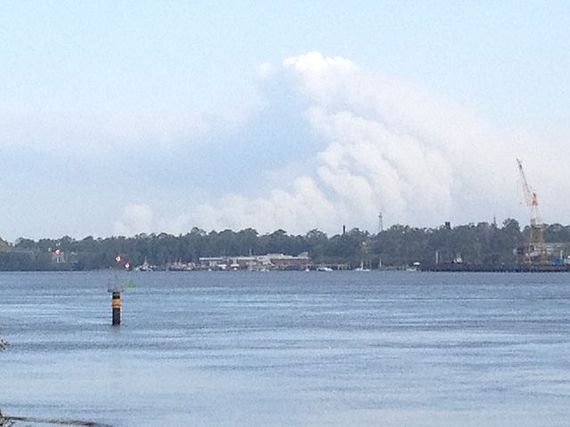Another fantastic post by climate campaigner, Guy Ragen, from the Australian Conservation Foundation. Since it's extremely difficult to find an American media home for this excellent Aussie analysis, I'm trusting that Huffington Post will raise the flag high on extreme weather events like this and their connection to global warming. Australia is burning because of climate change. Guy gives us an important on-the-ground perspective, a warning shot to the West. Hopefully, we'll take heed.
Like the U.S. southwest, southern Australia is at increased risk due to unprecedented heatwaves, droughts and fires, the likes of which have ravaged countries across the globe in recent years in connection to climate change. Australia, in particular, as one of the first and most impacted developed countries, bears a special burden and responsibility to help mitigate the worst impacts of climate change while the window of opportunity is still open.
In Australia, the impacts of climate change are already playing out, and these provide no small incentive to take greater action. Already in 2015, the dry, intense summer heat has topped 110 degrees Fahrenheit and fueled a massive bushfire that has masked the blue summer sky with a luminous orange haze. The smell, a strange combination of smoke and eucalyptus, travels with the hot desert wind and lingers for days. When bushfires arrive, tragedy unfolds; lives are endangered and lost; homes and memories turn to ash; and animals suffer unseen losses.
This is the reality playing out across South Australia and the southern state of Victoria. The Adelaide Hills, on the outskirts of the South Australian state capital, have been particularly ravaged, with the loss of thousands of hectares of bush, dozens of injuries, and homes. Due to the bushfire's severity, South Australian state Premier, Jay Weatherill, declared a state emergency, urging residents to leave their homes for what could be days.
Victoria--where memories of the 2009 Black Saturday fires that killed 173 people are still raw--has seen numerous emergencies declared since the New Year. In both states, hundreds of firefighters from across the country are waging a round-the-clock battle against both the fires and the weather. And more extreme heat is on the way.
While bushfires have always been part of the Australian summer, there is growing evidence that climate change is making matters a lot worse. In mid-November, Australia's main bushfire research body issued a stark warning, updating its southern Australia summer forecast after a particularly warm and dry spring. Australia suddenly faced a worse bushfire season than previously predicted. Much worse.
None of this comes as a surprise. The Climate Commission, which the Australian Federal Government abolished as one of its first political acts, warned back in 2012 that climate change was creating the conditions for worse bushfire seasons. Climate change is bringing warmer and drier springs in the south, followed by summers with more extreme and long lasting heatwaves. On Tuesday, the Australian Bureau of Meteorology released its Annual Climate Statement finding that Australia just experienced its hottest decade, with seven of our ten hottest years on record occurring since 2002.
All these trends point to the reality that global warming is here, and Australia is seeing its impact through greater bushfire risk.
Fortunately, there is still time--as the World Meteorological Organization said in December--to prevent dangerous climate change and preserve the planet for future generations. Unfortunately, the past twelve months have seen Australia's political leaders moving in the wrong direction when urgent action is needed.
While countries across the globe are beginning to take bold action--with China setting a goal for peak emissions and the U.S. demonstrating its serious commitment to climate action by establishing the Clean Power Plan--Australia has lagged behind. We had a carbon price that successfully cut pollution, but the government abolished it, allowing big polluting companies to pollute for free. We have a Renewable Energy Target that has been fostering clean energy development, but the government is undermining it. Countries are more cooperative during global negotiations, yet the Australian government persists in playing a negative role.
2015 is a critical year. Whether or not an aggressive international agreement to reduce global emissions is reached at the UN Conference of Parties meeting in Paris will likely decide the fate of the Australian summer, which occupies a special place in the national imagination. There exists an uneasy balance between the idyll of long, lazy days taken off from work, perhaps spent on the beach, and the harshness of the Australian continent; the heat can be brutal, droughts severe and fires out of control.
Climate change is tipping the balance as thousands of Australians are now preparing for another wave of catastrophic bushfire conditions. But extreme heat must embolden more than destructive fires, and fires must ignite more than dry landscapes. We need urgent action worldwide. From California to Victoria, those impacted by extreme climate change impacts must connect the dots, speaking out and pushing leaders to take bold action.

